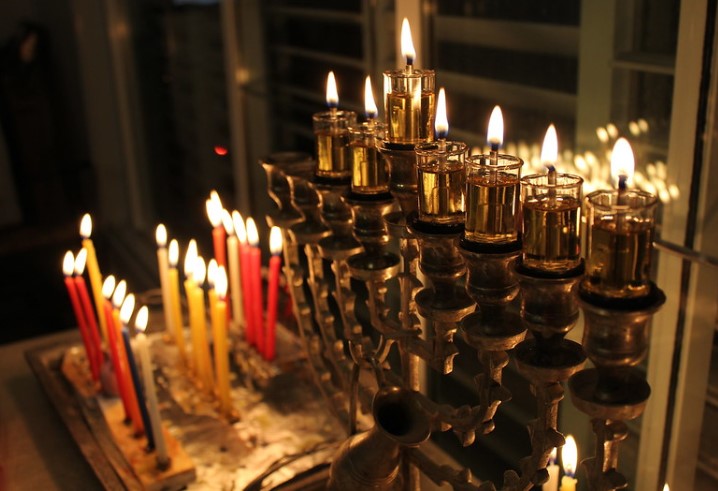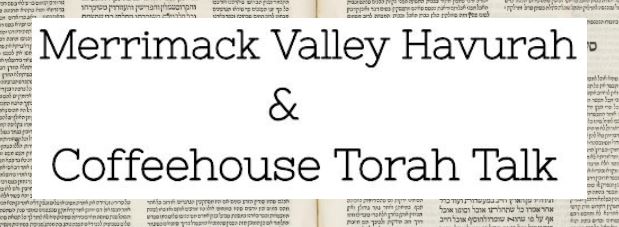
Hanukkah חֲנֻכָּה (“dedication”) is a joyous Jewish holiday also known as Hag Ha’urim חַג הַאוּרִים (Festival of Lights.)
We commemorate the victory of the Maccabees over the pagan Hellenist armies of Syria in 165 B.C.E. and the subsequent rededication of the Temple in Jerusalem.
We celebrate with the public lighting of a hanukkiyah (a special type of candelabra); going to services at synagogue; the prayer “For the miracles,” Al Ha’Nissim, עַל הַנִסִּים ; eating food prepared in oil including latkes (potato pancakes) and sufganiyot (jelly doughnuts); and of course a plethora of songs and games.
Where is the story from?
It is not from the Hebrew Bible but instead from I Maccabees, part of the Jewish apocrypha. This was written in Hebrew by a Jewish author after the restoration of an independent Jewish kingdom, in the latter part of the 2nd century BCE. The original Hebrew text was lost, but we still have the Greek translation in the Septuagint.
The Hebrew name Maccabee means “hammer”, and referred to a leader of the Jewish revolt, Judas. His military attacks were said to be hammer-like. The name eventually came to be used for his brothers as well, which accounts for the title of the book. Interestingly, Maccabees is in most Christian Bibles although not in the Jewish one.
Hanukkah – The story
We begin during the time of Alexander the Great. Around 330 BCE his armies conquered Syria, Egypt and Eretz Yisrael (renamed Palestine,) yet allowed the lands under his control to observe their own religions and retain cultural and day-to-day life autonomy. During this time Jews lived in their ancestral homeland, Erezt Yisrael, and were free to live their lives and observe their faith.
After Alexander’s death his empire fell apart. No one successor could be agreed upon. And so his one might empire broke into several empires, as shown on the map below. The story of Hanukkah concerns the Seleucid Empire, shown on the map below.
Contrary to popular perception, the battle was not between the Maccabees and the Greeks. The nation of Greece, as shown here, was not part of the Seleucid Empire. Rather, the Seleucids were an empire of different kingdoms and ethnic groups, united by a common ruler and army. It was a Hellenic civilization, meaning that it had a Greek language, religion and philosophy, so in that sense people see Hanukkah as a battle against Greeks. However most people in this large empire were not Greek.

another map

Around 170 CE we see the rise of a successor of Alexander, Antiochus IV Epiphanes (often called “The Mad.”) A Hellenist pagan, he oppressed Jews severely. He placed a pagan priest in the Holy Temple in Jerusalem; desecrated it by requiring the sacrifice of pigs on the altar; forbade Jews from studying Torah, keeping kosher, or having circumcision; and he mandated assimilation. His forces tortured and murdered Jewish people who nonetheless kept their faith.
Eventually Jews rose up against their oppressors – two separate groups, in fact. One was led by Mattathias the Hasmonean his son Judah [Maccabee,] and Judah’s brothers. Another groups was known as the Chasidim, forerunners of the Pharisees (no connection to the modern Chasidism). They joined forces in an eventually successful revolt!
The Holy Temple was rededicated – “chanukah” – and this yields the name of our holiday.
Why 8 days?
The legend of sacramental oil lasting for 8 days comes from a later time. The Book of Maccabees itself has a different reason for the length of this holiday. During the war of liberation against the Hellenists, Jews were unable to observe the Festival of Sukkot. After the success of our revolution, the people held an 8 day festival to make up for missing Sukkot. The Book of Maccabees calls this holiday Sukkot ‘b’Kislev (“Sukkot in Kislev”)
As such, there were lulavim at the first Chanukah! We read in 2 Maccabees 10:7-9
7. Therefore bearing ivy-wreathed wands and beautiful branches and also fronds of palm, they offered hymns of thanksgiving to God who had given success to the purifying of His own holy place.
8. They decreed by public ordinance and vote that the whole nation of the Jews should observe these days every year.
9. Such then was the end of Antiochus, who was called Epiphanes.
The Aruch Hashulchan, Orekh Khayyim אורח חיים 670:5, states
The Sefer Chashmona’i says that in the year before Matisyahu’s rebellion, Antiochus prevented the korbanot [near-offerings] of Sukkot and Shemini Atzeret. Therefore, the Jews were able to re-inaugurate the Beit Hamikdash [Holy Temple], they celebrated for eight days, in order to show that they were making up for the lost days of Sukkot and Shemini Atzeret.
The story of the oil that most people know comes from the Babylonian Talmud. It says that at the time of the rededication there was very little ritually pure olive oil left that had not been defiled by the Greeks. Such oil was needed for the Temple’s seven branched menorah, meant to burn throughout the night every night.
Although there was only enough oil to burn for one day, miraculously it kept burning until more oil could be prepared, 7 more days. This was seen as a sign that Maccabee victory was blessed by God, thus the holiday was established to be 8 days (he one plus the 7.)
Is Chanukah the Jewish Christmas?
No. Chanukah is the story of a miraculous revolt against an anti-Semitic empire. It is the first successful war for religious freedom.
How to Explain That Hanukkah is Not the Jewish Christmas
Hey American businesses: Hanukkah is not the Jewish Christmas
Sephardic approach
Here is a Sephardic resource for blessings, Ladino songs and a bumuelos recipe.
Sephardic halakhot and customs for Hanouka
Sephardi Federation pbc.org – Hanukah
Manna from heaven: Bumuelos, a Sephardic Hanukkah treat
A Sephardic Hanukkah, Chicago Tribune
Books on Hanukkah
For Jewish families with younger children, “There’s No Such Thing as a Chanukah Bush, Sandy Goldstein,” by Susan Sussman and Charles Robinson
This classic holiday book tells the story of a little Jewish girl at Christmastime. It is her wise grandfather who helps her understand the difference between sharing something because she believes in it, and helping friends celebrate something because they believe in it. Recommended by the National Conference of Christians and Jews as “a story promoting brotherhood and understanding.”
The Hanukkah Anthology (JPS Holiday Anthology series) Philip Goodman
Unequaled in-depth compilations of classic and contemporary writings [this has] long guided rabbis, cantors, educators, and other readers seeking the origins, meanings, and varied celebrations of the Jewish festivals…. biblical intimations of the festival, post-biblical writings, selections from the Talmud and midrashim, excerpts from medieval books, home liturgies, laws and customs, observances in different nations, stories and poems, art, and recipes.
“The Jewish Holidays: A Guide and Commentary” Michael Strassfeld
“The Jewish Way: Living The Holidays” Irving Greenberg
Videos
The Maccabeats – Hasmonean – A Hamilton Hanukkah. Originally by Lin-Manuel Miranda, this video by Uri Westrich.
https://www.youtube.com/watch?v=u3UubcYj49k
Miracle – Matisyahu Hanukkah
Hanukkah and the Maccabees in Christian art & music
Many people today feel that the story of Hannukah is of concern only for the Jewish community. Readers may thus be surprised that historically it has been the Christian community which has read the book of Maccabees more often, and has been producing art, sculpture and music based on it. The story of the Maccabees is a part of Western Civilization through both Jewish and Christian culture. In this article we take a look at the art, music, and sculpture of Hannukah.
Is Chanukah mentioned in the Hebrew Bible?
The biblical Book of Daniel was finalized just a few years before the Maccabean revolt (167 to 160 BCE) – the era of the Chanukah story! Chapters 7–12 of Daniel reflect Judea in 167–164 BCE when Antiochus IV Epiphanes, the Hellenized king of the Seleucid Empire, threatened to destroy Judaism in the land of Israel.
So why does the Book of Daniel not reflect the Maccabean revolt (Chanukah)? Because the writing of it ended just a few years before the Maccabee’s successful fight.
See “The Lead up to Chanukah in the Book of Daniel” – Reading the Biblical Book of Daniel as a Source on the Maccabean Revolt, by Prof. Lawrence M. Wills – The Lead Up to Chanukah in the Book of Daniel
Are there other reasons why this book didn’t make it into our Tanakh? The rabbis were not happy with the long-term outcome of the Chanukah story: Although the Maccabees were righteous and victorious, their descendants set up a kingdom which faltered through corruption a mere one hundred years later. The rabbis also disapproved of the Hasmoneans laying claim to both the monarchy and the High Priesthood.
Rabbi Joshua Yuter writes “The Maccabees are role models for fighting against tyranny, and a cautionary tale for when revolutionaries attain political power.”
Related articles
See Hanukkah is about countering antisemitism: Be aware of Hanukkah Erasure.
Eli Segal writes “There is one exploit from the Hanukkah saga that has always captured my imagination with a special vividness. The heroic battle of Judah Maccabee against the Greek elephants at Beth Zechariah had all the vibrancy and spectacle of a technicolor epic.” – Eleazar Died for Our Sins, by Eliezer Segal
Rabbi Natan Slifkin offers this us this window into how Haredi groups accepted the historical legitimacy of the books of Maccabees, even though these books aren’t canonized as Biblical – Kosher Certification for Maccabees How did ArtScroll make the book of Maccabees kosher?
Arts & Crafts
Chanukah Sameakh! חנוכה שמח. I built a whiskey-bottle-menorah.
Why don’t Jews decorate for Chanukah in the same way that Christians do for Christmas?
Rivkah Lambert Adler, an Israeli Jewish writers, offers these thoughts: “Why I Don’t Decorate For Chanukah” Jewish Values Online 4/12/2017
Discussions over which stores have more prominent displays of Chanukah decorations. Expressions of anger and alienation that Chanukah isn’t acknowledged in stores. Feeling overwhelmed by the Christmas displays and Christmas music. Expressions of annoyance that we know all about their holidays but they try to sell us ham and matza on Chanukah. And the counter-comments, reminding people that Chanukah is a minor holiday on the Jewish calendar and that somehow, in America, it morphed into some kind of Jewish Christmas. As someone who has been living in Israel for the past seven Chanukahs, I’d like to make a few observation…
“Why I Don’t Decorate For Chanukah”
How is it really spelled?
Why write “Hanukkah” instead of “Chanukah” – surely one spelling is right and the other is wrong? The reason for the spelling confusion is the limitations of the English alphabet. Hanukkah is a Hebrew word (חנוכה)
That first letter, ח , has a guttural sound which used to exist in ancient English, but doesn’t exist in modern English. Technically, the modern Hebrew pronunciation of this letter is called a voiceless uvular fricative (/χ/)
So there are *four* ways to represent this sound first letter using English letters
KH – Khanukah (used in old fashioned translations of Yiddish)
CH – Chanukah
H – Hanukkah (the extra ‘k’ is added just to make it 8 letters long.)
H – Ḥanukah (notice the H with a dot under it.)
Each of these transliterations is equally valid.
Related articles!
Hanukkah: All about the holiday
Hanukkah is about countering antisemitism: Be aware of Hanukkah Erasure
Hanukkah in classical art and music
Hanukkah 2021 Merrimack Valley & Boston
Halakhah of Hanukkah
The laws of Hanukkah, A Guide to Religious Practice, Isaac Klein, JTS, Conservative Judaism
Practical Guide to the Laws of Ḥanukka according to the Geonic/ Maimonidean Tradition
_____________________________________________________





